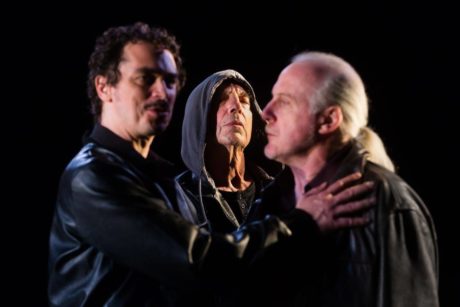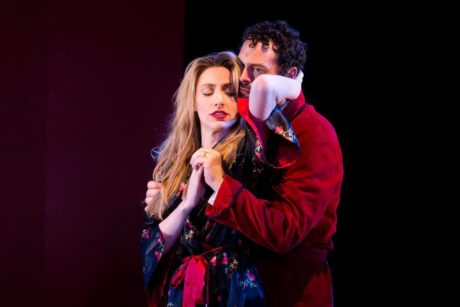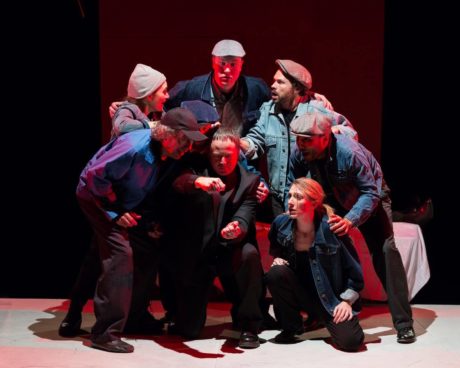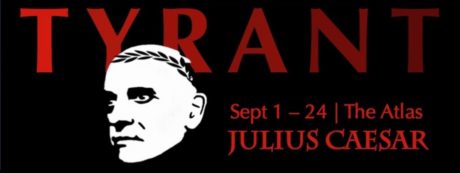Diamond Julesy Gets It
Shakespeare’s Julius Caesar has recently become a cause célèbre. When Caesar was portrayed in a Public Theater production with a Trump-like costume and wig, there were protests. Some people rushed the stage. The actor who played Brutus, Corey Stoll, described it this way to Time magazine (6/26/17):
A beat after I stabbed Caesar and he fell to the floor, I saw a flash of a white shirt, and a woman shouting something I couldn’t understand. Covered in blood and holding a very real knife, I was already in fight-or-flight mode,” he described. “Luckily, our stage manager Buzz Cohen asked for security to escort our visitor out before anyone got hurt… After a brief pause Buzz said, ‘Actors, let’s pick it up from ‘liberty and freedom.’”
There are times when stage managers are truly heroic; not to mention the actors who face the public and continue to do their job in the face of threats and even violence. In this case, the theater lost two sponsors, and theaters with “Shakespeare” in their name apparently received threatening missives. Largely obscured by the controversy was the fact that, in many ways, Julius Caesar and Donald Trump aren’t very much alike at all.

The international Scena Theatre’s production casts Caesar (Robert McNamara) as a kind of Mafia don, surrounded by insincere toadies and would-be revolutionaries. Full of inspired directorial ideas, and satirical modern touches, this Caesar reminds us how timeless and necessary Shakespeare really is. Founder/Artistic Director and director of this production, McNamara is to be congratulated on offering us a muscular, action-packed version of one of Shakespeare’s finest plays.
The crowd, a character in and of itself, is everywhere. Chanting “Caesar! Caesar!” Switching allegiances from Brutus to Mark Anthony. Turning on the helpless and spreading the latest terrifying rumors around the desperate city. It is difficult to accept that our populace encompasses white nationalists with tiki torches. Still, it is an excellent time to remember how fickle human beings can be when they turn into a mob.
McNamara as Caesar is drunk on his own arrogance. He flicks his admirers away like flies. It is almost as if he believes he is already on Olympus with the rest of the gods, lowering himself to govern such inferior mortals. There is little of the aristocrat in him, and none of the clemency he sometimes showed to his enemies. It is easy to see how he has become so resented, even by Brutus, a dear friend who was, some believed, his illegitimate son.
As a director, McNamara is well served by his international cast. David Bryan Jackson as Cassius is the engine of the play, driving the plot forward with unctuous thoroughness. Barry McEvoy’s Mark Antony is deeply traumatized, yet full of dramatic power. His eulogy for Caesar is one of the high points of the production. As the Soothsayer, Greg Ongao has a strong stage presence and creates a palpable atmosphere of menace.

Brutus (Ian Blackwell Rogers) is probably one of the most difficult parts in the Shakespearean canon. Intellectual, somewhat distant, and some might say hypocritical, his is the betrayal that ultimately breaks Caesar’s heart. Some critics compare him to Judas. Although in Plutarch Caesar died of 23 stab wounds, Shakespeare turns it into 33, the age Jesus was when he died. Dante placed Brutus in the 9th circle of hell with Cassius and Judas.
Rogers has some particularly compelling moments in the famous “Quarrel” scene with Cassius, and again when the ghost of Caesar appears to him before the battle of Philippi. But there is also the superb scene with Portia (Amanda Forstrom). In this brief exchange, we learn enough to imagine an entire marriage. Amanda Forstrom as Portia is fully her husband’s equal, demanding the truth and insisting on being a partner instead of a pleasant diversion. Anne Nottage is a fine Calphurnia, even though Caesar’s dismissive attitude toward her fears for his safety is only too believable.
And, oh, the wonders of Ron Litman’s Casca, as he describes the efforts to offer Caesar a crown, eyes blazing, hands gesturing every second. He shows us in no uncertain terms that he has absolutely HAD IT with Caesar, and that is existentially that.
The tension builds after the assassination, and the danger is even greater. The horror of it, for the conspirators, is that they have not killed Caesar’s influence. In some ways, he is more beloved than ever. David Bryan Jackson as Cassius has some particularly striking scenes as the pressure becomes overwhelming.
The conspirators, in black suits, as befits the associates of a mob boss, each make a distinct impression. Louis Lavoie (Metellus Cimber), Kevin Boudreau (Cinna), Daniel Noake (Trebonius), and Robert Scheire (Decius Brutus) are a formidable group. Led by the jealous Cassius and the conflicted Brutus, they are successful – at first. Their subsequent history is a common one for all such plotters and as contemporary as ever.
One of the few tender moments of the evening occurs when Brutus hesitates to wake up his sleeping servant Lucius (Danielle Scott). Scott does well in her role, by simply being herself and not pretending to be a boy. Kim Curtis, as Cicero, Lepidus, and Ligarius (!) is as enjoyable as ever. Cicero’s death offstage is one of the many ominous signs for the Republic.

The Ensemble (Kevin Boudreau, Kim Curtis, Amanda Forstrom, David Johnson, Louis Lavoie, Ron Litman, Daniel Noake, Danielle Scott, Robert Scheire, and Greg Ongao) shout, run, chant, and stomp with exceptional commitment. One gets the sense that they could blow the roof right off the theatre, and I encourage them to try.
The Set Designer, Jonathan Dahm Robertson, relies largely on projections (he is Video & Projections Designer, with assistance from Natalia Gleason) to set the tone. Some enhance the theme of a Rome which resembles today’s DC. We see, among other things, the Pentagon, the JFK assassination, the Capitol Building, and RNN Breaking News: CAESAR IS DEAD! Others are more traditional: fire; dead soldiers; “Aut Caesar aut nihil” (Caesar or nothing). One of the most impressive is the Greek “καὶ σύ, τέκνον;”[ (you too, child) which Suetonius says some believed were Caesar’s last words.
The use of a few key set items works well; a hospital bed and a ladder, for example. Costume Designer Heather Jackson uses black very effectively. Sunglasses, Caesar’s bloody (white) jacket, and Brutus’s red robe all become part of the action. Sound, by Sound Designer Denise Rose, includes brooding, dark music, whispers, cries, and song. All are evocative. Lighting Design (Jonathan Alexander) combines expressively with the projections to create the mood.
The actors show remarkable facility with Shakespeare’s magnificent language. The cuts to the script are well chosen. Energy and commitment are the leitmotifs of this production.
Cicero once said of Caesar: “When I notice how carefully arranged his hair is and when I watch him adjusting the parting with one finger, I cannot imagine that this man could conceive of such a wicked thing as to destroy the [Roman] constitution.” One could imagine one Senator saying this about another on Capitol Hill, any day of the week.
Running Time: One hour and 50 minutes, with no intermission.
Julius Caesar plays through September 23, 2017 at Scena Theatre performing at Atlas Performing Arts Center – 1333 H Street, NE, in Washington, DC. For tickets, buy them at the door or purchase them online.






What a fantastic production! Go see it, and bring the teens–my son loved it. The pace is fast, and the staging and direction make the story move. But those who love the language can savor it all. The review here is spot on. Mark Antony is magnificent, as is the soothsayer, whose words are rightly chilling. I don’t wish to shortchange Caesar, Brutus, Portia, Cassius–there was not a weak performance. But the extras are excellent and it is very compelling to see the shifting mood of the ‘crowd’ or mob. A great, no-fuss, afternoon of Shakespeare at an affordable price in a terrific setting. I’ll be back.